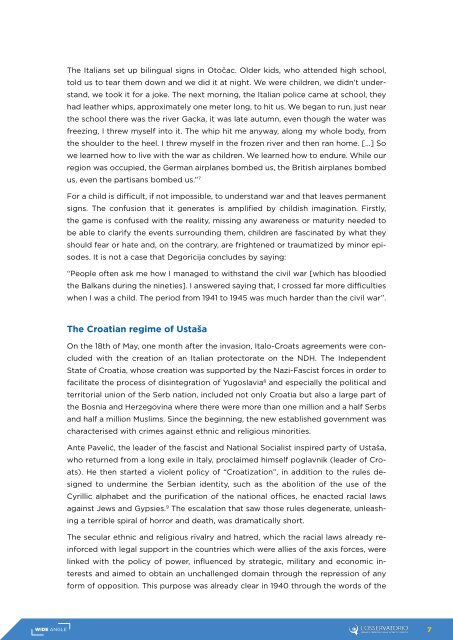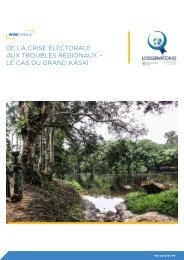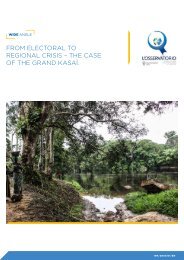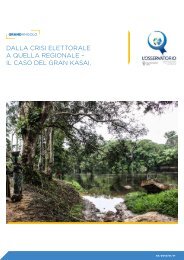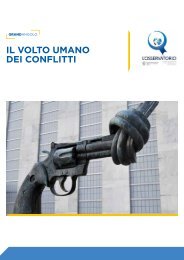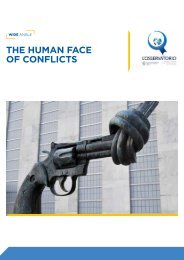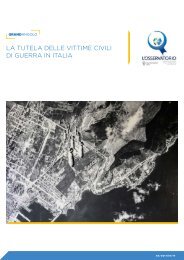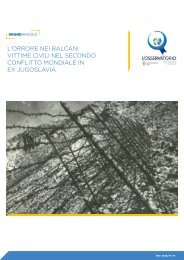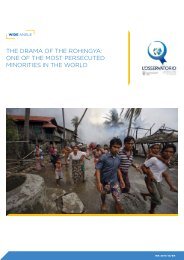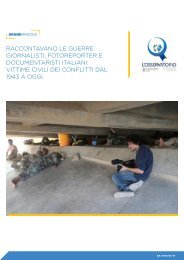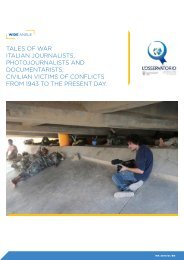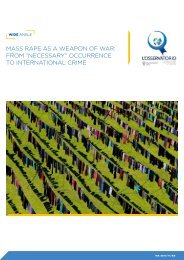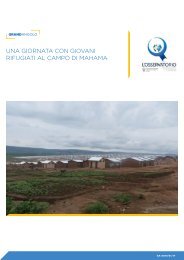The Horror in the Balkans. Civilian Victims in the Second World War in the Former Yugoslavia
You also want an ePaper? Increase the reach of your titles
YUMPU automatically turns print PDFs into web optimized ePapers that Google loves.
<strong>The</strong> Italians set up bil<strong>in</strong>gual signs <strong>in</strong> Otočac. Older kids, who attended high school,<br />
told us to tear <strong>the</strong>m down and we did it at night. We were children, we didn’t understand,<br />
we took it for a joke. <strong>The</strong> next morn<strong>in</strong>g, <strong>the</strong> Italian police came at school, <strong>the</strong>y<br />
had lea<strong>the</strong>r whips, approximately one meter long, to hit us. We began to run, just near<br />
<strong>the</strong> school <strong>the</strong>re was <strong>the</strong> river Gacka, it was late autumn, even though <strong>the</strong> water was<br />
freez<strong>in</strong>g, I threw myself <strong>in</strong>to it. <strong>The</strong> whip hit me anyway, along my whole body, from<br />
<strong>the</strong> shoulder to <strong>the</strong> heel. I threw myself <strong>in</strong> <strong>the</strong> frozen river and <strong>the</strong>n ran home. […] So<br />
we learned how to live with <strong>the</strong> war as children. We learned how to endure. While our<br />
region was occupied, <strong>the</strong> German airplanes bombed us, <strong>the</strong> British airplanes bombed<br />
us, even <strong>the</strong> partisans bombed us.” 7<br />
For a child is difficult, if not impossible, to understand war and that leaves permanent<br />
signs. <strong>The</strong> confusion that it generates is amplified by childish imag<strong>in</strong>ation. Firstly,<br />
<strong>the</strong> game is confused with <strong>the</strong> reality, miss<strong>in</strong>g any awareness or maturity needed to<br />
be able to clarify <strong>the</strong> events surround<strong>in</strong>g <strong>the</strong>m, children are fasc<strong>in</strong>ated by what <strong>the</strong>y<br />
should fear or hate and, on <strong>the</strong> contrary, are frightened or traumatized by m<strong>in</strong>or episodes.<br />
It is not a case that Degoricija concludes by say<strong>in</strong>g:<br />
“People often ask me how I managed to withstand <strong>the</strong> civil war [which has bloodied<br />
<strong>the</strong> <strong>Balkans</strong> dur<strong>in</strong>g <strong>the</strong> n<strong>in</strong>eties]. I answered say<strong>in</strong>g that, I crossed far more difficulties<br />
when I was a child. <strong>The</strong> period from 1941 to 1945 was much harder than <strong>the</strong> civil war”.<br />
<strong>The</strong> Croatian regime of Ustaša<br />
On <strong>the</strong> 18th of May, one month after <strong>the</strong> <strong>in</strong>vasion, Italo-Croats agreements were concluded<br />
with <strong>the</strong> creation of an Italian protectorate on <strong>the</strong> NDH. <strong>The</strong> Independent<br />
State of Croatia, whose creation was supported by <strong>the</strong> Nazi-Fascist forces <strong>in</strong> order to<br />
facilitate <strong>the</strong> process of dis<strong>in</strong>tegration of <strong>Yugoslavia</strong> 8 and especially <strong>the</strong> political and<br />
territorial union of <strong>the</strong> Serb nation, <strong>in</strong>cluded not only Croatia but also a large part of<br />
<strong>the</strong> Bosnia and Herzegov<strong>in</strong>a where <strong>the</strong>re were more than one million and a half Serbs<br />
and half a million Muslims. S<strong>in</strong>ce <strong>the</strong> beg<strong>in</strong>n<strong>in</strong>g, <strong>the</strong> new established government was<br />
characterised with crimes aga<strong>in</strong>st ethnic and religious m<strong>in</strong>orities.<br />
Ante Pavelić, <strong>the</strong> leader of <strong>the</strong> fascist and National Socialist <strong>in</strong>spired party of Ustaša,<br />
who returned from a long exile <strong>in</strong> Italy, proclaimed himself poglavnik (leader of Croats).<br />
He <strong>the</strong>n started a violent policy of “Croatization”, <strong>in</strong> addition to <strong>the</strong> rules designed<br />
to underm<strong>in</strong>e <strong>the</strong> Serbian identity, such as <strong>the</strong> abolition of <strong>the</strong> use of <strong>the</strong><br />
Cyrillic alphabet and <strong>the</strong> purification of <strong>the</strong> national offices, he enacted racial laws<br />
aga<strong>in</strong>st Jews and Gypsies. 9 <strong>The</strong> escalation that saw those rules degenerate, unleash<strong>in</strong>g<br />
a terrible spiral of horror and death, was dramatically short.<br />
<strong>The</strong> secular ethnic and religious rivalry and hatred, which <strong>the</strong> racial laws already re<strong>in</strong>forced<br />
with legal support <strong>in</strong> <strong>the</strong> countries which were allies of <strong>the</strong> axis forces, were<br />
l<strong>in</strong>ked with <strong>the</strong> policy of power, <strong>in</strong>fluenced by strategic, military and economic <strong>in</strong>terests<br />
and aimed to obta<strong>in</strong> an unchallenged doma<strong>in</strong> through <strong>the</strong> repression of any<br />
form of opposition. This purpose was already clear <strong>in</strong> 1940 through <strong>the</strong> words of <strong>the</strong><br />
7


